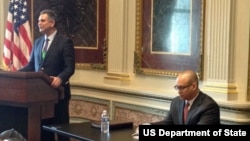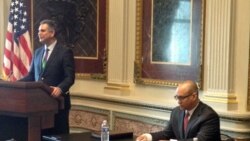Sub-Saharan Africa, boasting seven of the ten fastest growing economies, is a good bet to be the world's next major economic success story. To help accelerate the process, President Barack Obama committed the United States to increase efforts to spur the region’s economic growth, trade and investment.
During his recent visit to Tanzania, President Obama pledged to bring about a new level of economic engagement with Africa. The Doing Business in Africa, or DBIA Campaign, launched in November 2012, is a key program to help develop the African market.
“Through the DBIA campaign, we are responding to the emergence of African regional economic communities, and working with our partners to deepen integration, reduce barriers to trade and investment, and support existing and new investments by American businesses. By doing so, we continue the work of creating jobs and expanding economic opportunity that will help drive our economy and support the growth of our African trading partners,” said President Obama.
Speaking at a Doing Business in Africa Forum in late July, Under Secretary of Commerce for International Trade Francisco Sánchez advised business leaders that if they wish to expand their business overseas, Africa is a key destination. Although trade between the United States and Africa has nearly tripled in the past decade, only two percent of our exports go to the region.
“So we know there is room for growth. There are opportunities to do more,” said Under Secretary Sánchez.
“The Doing Business in Africa is a whole-of-government effort,” he said. And “the [U.S.] government is behind the effort because it fits in with so many of our priorities. By expanding our exports to Africa, we are also creating and supporting jobs here at home.
“Equally important, we are creating opportunity and prosperity for Africans. We’re helping develop the region by providing infrastructure – power, roads and bridges. That will support growth and create new opportunities for current and future generations of Africans.”
The United States hopes to build strong economic and trade partnerships in Africa, because they will help fuel growth and enhance prosperity for Africans even as they create jobs in the United States. Such partnerships will help us reach our respective goals.
During his recent visit to Tanzania, President Obama pledged to bring about a new level of economic engagement with Africa. The Doing Business in Africa, or DBIA Campaign, launched in November 2012, is a key program to help develop the African market.
“Through the DBIA campaign, we are responding to the emergence of African regional economic communities, and working with our partners to deepen integration, reduce barriers to trade and investment, and support existing and new investments by American businesses. By doing so, we continue the work of creating jobs and expanding economic opportunity that will help drive our economy and support the growth of our African trading partners,” said President Obama.
Speaking at a Doing Business in Africa Forum in late July, Under Secretary of Commerce for International Trade Francisco Sánchez advised business leaders that if they wish to expand their business overseas, Africa is a key destination. Although trade between the United States and Africa has nearly tripled in the past decade, only two percent of our exports go to the region.
“So we know there is room for growth. There are opportunities to do more,” said Under Secretary Sánchez.
“The Doing Business in Africa is a whole-of-government effort,” he said. And “the [U.S.] government is behind the effort because it fits in with so many of our priorities. By expanding our exports to Africa, we are also creating and supporting jobs here at home.
“Equally important, we are creating opportunity and prosperity for Africans. We’re helping develop the region by providing infrastructure – power, roads and bridges. That will support growth and create new opportunities for current and future generations of Africans.”
The United States hopes to build strong economic and trade partnerships in Africa, because they will help fuel growth and enhance prosperity for Africans even as they create jobs in the United States. Such partnerships will help us reach our respective goals.

















